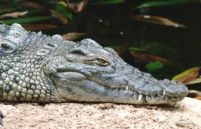Earlier research had revealed that crocodiles are very intelligent animals that care for their young and make use of tools to hunt. Now even more is known about their specialised hunting techniques.
Observing crocodile hunting behaviour is very tricky. These animals hunt by ambush, they eat infrequently because their metabolism is slow, and nearly all hunting occurs at night and/or in muddy waters. Vladimir Dinets, a researcher working at the University of Tennessee, took a new approach. Beyond more than 3000 hours of his own observations, he utilised Facebook and other social media to collect the findings of nature lovers and crocodile researchers, and also reports of spontaneous encounters with crocodiles. Dinets also searched the old notebooks of other scientists. Although this search yielded just a few handfuls of observations, some of which went back as far as the 19th century, all of the observations described the coordination and collaboration between crocodiles for hunting purposes. As numerous people on different continents all described this behaviour in the same way, Dinets found the information dependable. For instance, the crocodiles swam together to drive a school of fish into a tight group, and then took turns grabbing fish from this ‘bait ball’. Another observation involved a large saltwater crocodile that scared a pig, causing it to run into a lagoon where two smaller crocs were hiding and waiting. It is assumed that the large crocodile knew about the two others, even though they were not visible.
All in all, Dinets concludes that crocodiles are – perhaps right behind humans – some of the most expert hunters. At the same time, the scientist admits that we still have much to learn about their behaviour.
How crocodiles hunt
02januari2015
Crocodiles hunt in a team, as recently research has demonstrated. This makes them members of the elite club of approximately 20 animal species (including humans) with activities including sophisticated coordination among a number of individuals with different roles.
